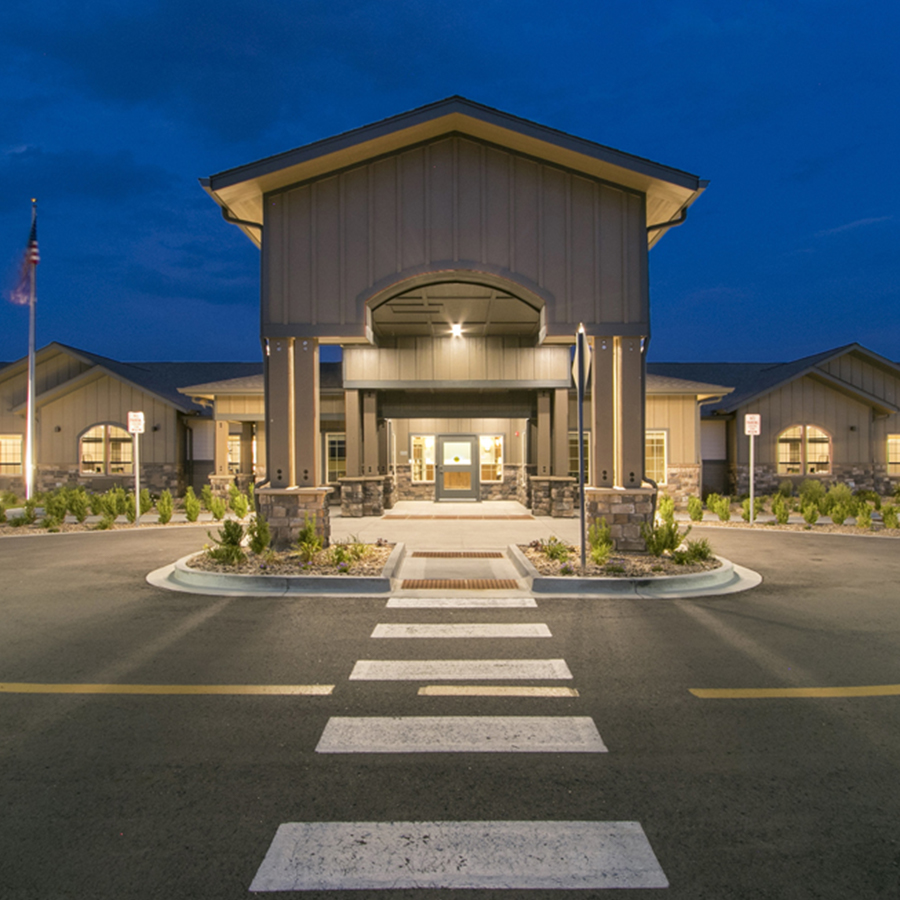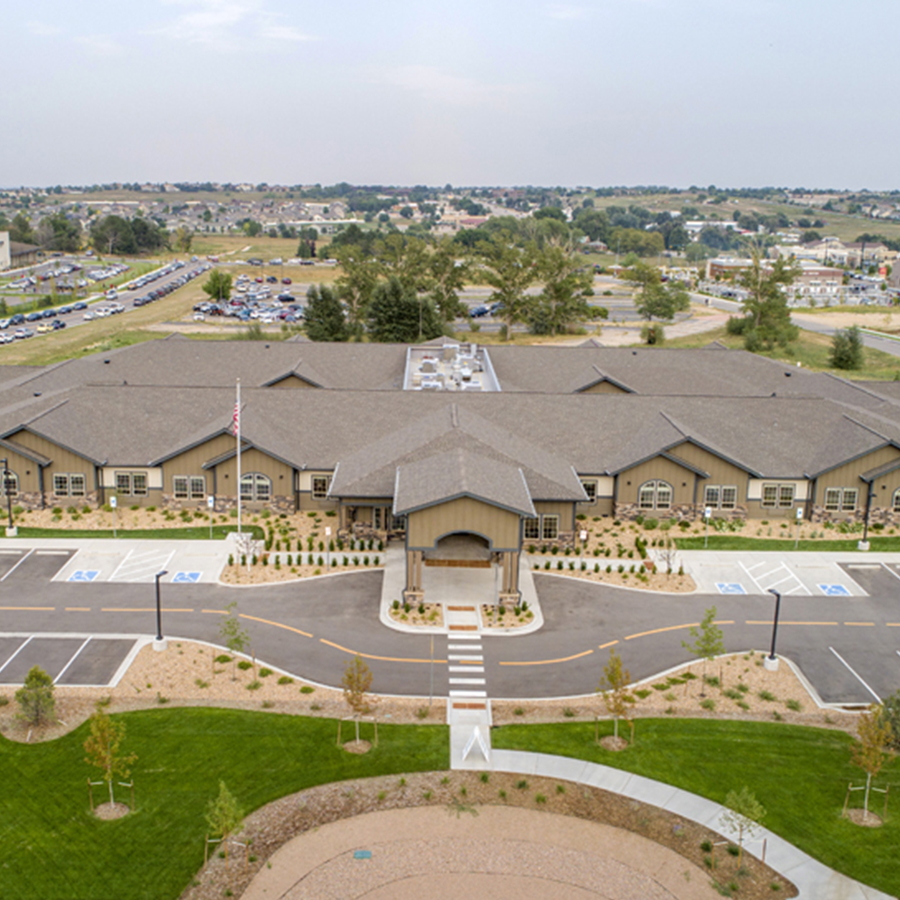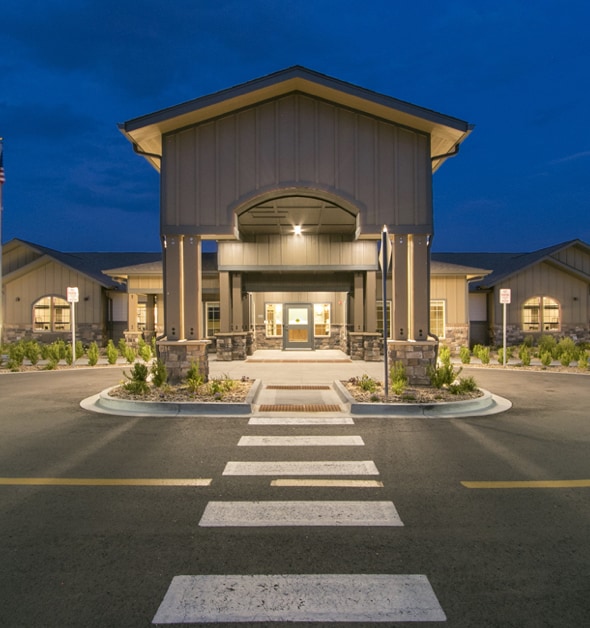Navigating the right support for a loved one with cognitive decline is rooted in compassion and care. As the condition progresses, their need for assistance often surpasses what you can safely and comfortably provide at home. Fortunately, professional care offers a solution for everyone.
Memory care and dementia care are two supportive environments that families may choose for their loved ones. Although they sound similar, they differ in their level of care.
Memory care is specialized long-term care for people experiencing early to moderate stages of cognitive decline. Dementia care is a broader term, encompassing various services to support those in the condition’s advanced stages.
While memory care encompasses daily care routines, therapies, and activities to stimulate cognitive function, dementia care offers more intensive medical oversight and hands-on assistance than memory care alone.
Finding the right community for your loved one is a labor of love. Our team at High Plains Crossing can help by offering a comprehensive tour of our memory care community.
All About Memory Care
Memory care is a specialized form of long-term care tailored for people experiencing conditions associated with cognitive decline, such as Alzheimer’s disease or other types of dementia.
These communities help stimulate cognitive function, support memory, and slow cognitive decline through specialized therapies and activities. People in memory care benefit from this community setting, where they can interact with others and maintain a sense of routine. Trained staff provide round-the-clock support, offering guidance with activities of daily living (ADLs) while encouraging independence where possible.
A range of services and amenities are offered in memory care, including:
- 24/7 supervision and assistance from trained staff
- Nutritious, well-balanced meals
- Personalized care plans tailored to each resident’s needs
- Safe monitoring, floor plans, and enclosed outdoor spaces to prevent wandering
- Therapeutic activities to stimulate memory and cognitive function
- Regular health monitoring and medication management
Everyone experiences cognitive decline differently, however, memory care is ideal for people in the condition’s early to moderate stage. Families often choose this option when they notice their loved ones having difficulties handling ADLs, such as preparing meals, managing medication, or personal grooming.
A key sign that it may be time for memory care is when caregiving at home is no longer safe and sustainable. This can include situations like wandering, safety hazards like mismanaging medications, forgetting to turn off appliances, or difficulty communicating, creating challenges too significant for families to handle without professional support.

Defining Dementia Care
On the other hand, dementia care is a broader term focusing on various types of care, including memory care. It provides higher levels of support for people experiencing advanced stages of cognitive decline.
This approach caters to the mental and physical challenges associated with severe dementia, offering more intensive medical oversight and hands-on assistance than memory care alone.
Dementia care is ideal when a loved one’s condition progresses to where they rely on others for most, or all, of their daily needs. Residents often require higher levels of physical care and supervision, as advanced dementia can affect their ability to move independently and communicate effectively with others.
Because memory care is included in dementia care, this community offers similar services and amenities, such as:
- 24/7 specialized nursing care
- Assistance with all daily activities (eating, bathing, dressing, etc.)
- Behavioral and emotional support tailored to dementia-specific conditions
- Emergency medical care and close health monitoring
- Nutritious meals that accommodate dietary restrictions
- Calming sensory rooms and nonverbal communication aids
The greater level of assistance and support in dementia care means this environment encompasses a wider range of services not offered in memory care. This may include:
- Personalized in-home care: Allows your loved one to stay in the comfort of their home while receiving help from trained professionals. This blends familiarity with essential support, making daily routines easier and less stressful.
- Adult day programs: Offers a safe and social environment during the day. They provide a mix of activities, therapeutic support, and supervision, giving caregivers a chance to recharge while confirming their loved ones stay active and connected.
- Supportive rehabilitation services: Physical, occupational, and speech therapies are valuable tools to help maintain their current functioning and slow cognitive decline.
- Compassionate hospice care: When dementia reaches its advanced stages, hospice care focuses on comfort, dignity, and quality of life. This delivers emotional and physical support, verifying your loved one feels cared for and at peace.
If your loved one’s physical safety is at risk because of wandering or falls, or if they require specialized dietary and medical care, dementia care may provide the stability and support they need.
How Memory & Dementia Care Offer Support
Although memory care and dementia care support people experiencing cognitive decline, their primary difference lies in the level of care provided.
Memory care focuses on people in the condition’s earlier to moderate stages by promoting independence, social connections, and cognitive function in a safe and supportive environment.
Dementia care, on the other hand, centers on people in the condition’s advanced stages, offering comprehensive medical oversight and 24/7 hands-on support for those who can no longer care for themselves.
Despite their difference in the level of care, memory, and dementia care offer personalized and compassionate care to verify residents receive the proper assistance and support they need.
Each community provides families peace of mind, knowing their loved one is in an environment specifically designed to cater to their unique needs, whether they’re in the early stages of cognitive decline or facing more advanced, complex symptoms.
Making the Right Choice for Your Loved One
Finding the care community appropriate for your loved one’s condition and overall wellness is an important decision, but you don’t have to explore it alone. Our High Plains Crossing team can help by offering a comprehensive tour of our memory care community and services.
Every step toward finding the right care brings you closer to giving your loved one the comfort and compassion they deserve.
Connect with us to schedule a tour of our memory care community.
















